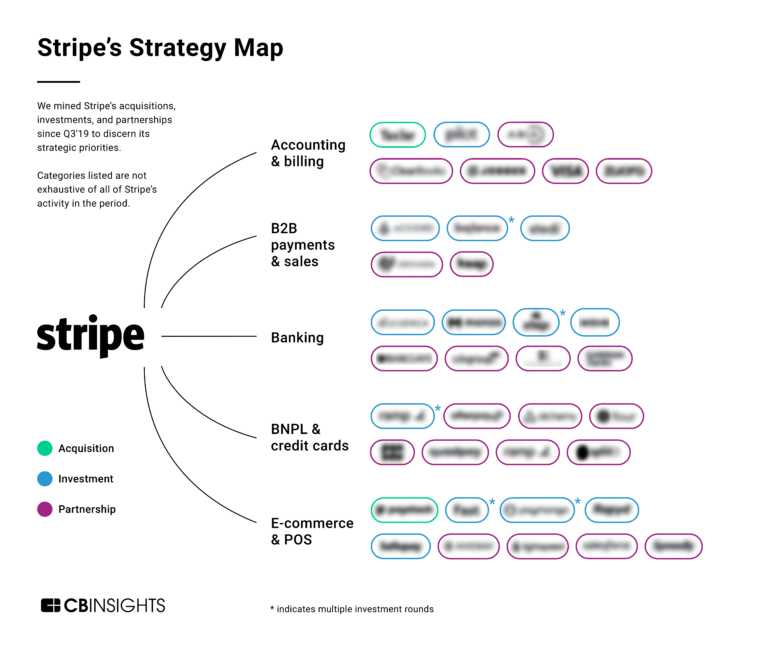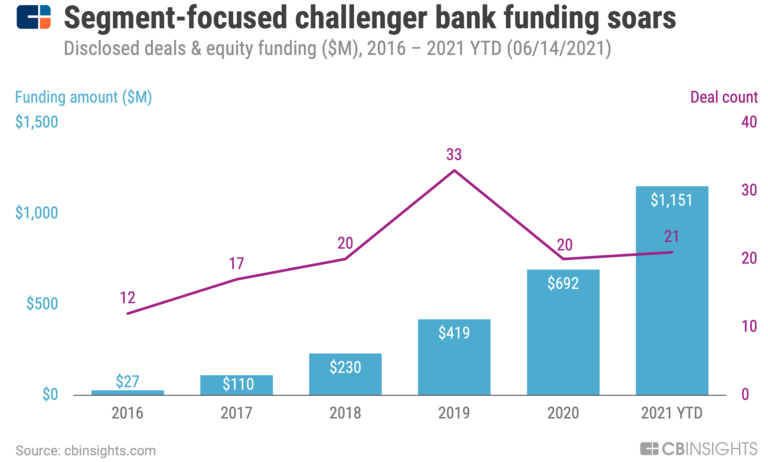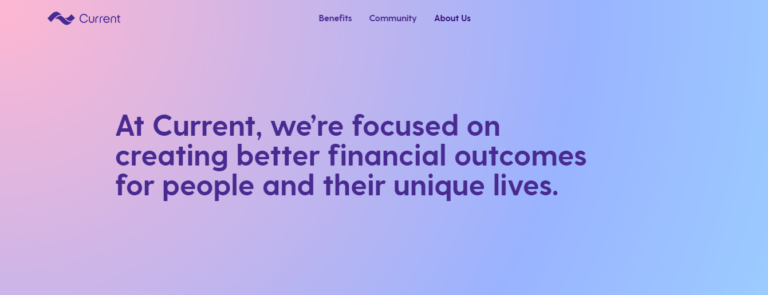
Step Mobile
Founded Year
2018Stage
Debt | AliveTotal Raised
$476.3MLast Raised
$300M | 7 mos agoAbout Step Mobile
Step Mobile provides financial tools to teens and families for modern-day banking needs. The platform, through its different solutions, promotes financial literacy in teens. It offers solutions such as saving, investing, and earning rewards. The firm offers a card that allows kids and teens under 18 to build positive credit history while developing spending habits. The company was founded in 2018 and is based in Palo Alto, California.
Compete with Step Mobile?
Ensure that your company and products are accurately represented on our platform.
Research containing Step Mobile
Get data-driven expert analysis from the CB Insights Intelligence Unit.
CB Insights Intelligence Analysts have mentioned Step Mobile in 4 CB Insights research briefs, most recently on Sep 22, 2021.

Expert Collections containing Step Mobile
Expert Collections are analyst-curated lists that highlight the companies you need to know in the most important technology spaces.
Step Mobile is included in 3 Expert Collections, including Banking.
Banking
1,071 items
Fintech
7,974 items
US-based companies
Fintech 250
250 items
250 of the top fintech companies transforming financial services
Step Mobile Patents
Step Mobile has filed 1 patent.
The 3 most popular patent topics include:
- Banking
- Credit
- Cryptocurrencies

Application Date | Grant Date | Title | Related Topics | Status |
|---|---|---|---|---|
12/17/2021 | 5/3/2022 | Payment systems, Credit, Cryptocurrencies, Banking, Data security | Grant |
Application Date | 12/17/2021 |
|---|---|
Grant Date | 5/3/2022 |
Title | |
Related Topics | Payment systems, Credit, Cryptocurrencies, Banking, Data security |
Status | Grant |
Latest Step Mobile News
Feb 26, 2020
Next Step Mobile Surveillance: How You Walk, Your Heartbeat – Why Bitcoin Matters to Combat Government Privacy Invasion It may sound like something from a dystopian cyberpunk movie, but payment providers could soon be validating transactions by the way users walk, their heartbeat, veins, and more. Mastercard has recently revealed they “have been testing heartbeat, vein technology, and the way people walk to authenticate people.” The high tech proposal, designed to fight hackers and increase convenience, could be a serious issue for people viewing such measures as unnecessary and invasive, where Bitcoin solves many of the challenges facing online finance already. Mastercard to Map Your Walk Mega payments provider Mastercard recently revealed to financial news outlet Marketwatch that “We are working with transport organizations where your face or gait will authenticate you.” While facial recognition software is becoming more and more widely utilized in security, and the field of biometrics continues to evolve rapidly, most everyday people still haven’t considered that something like their gait, or style of walking, could be a means of identification. The tech will ostensibly be able to utilize CCTV, amongst other means, for allowing services such as boarding of public transport. The president of cyber and intelligence solutions for Mastercard, Ajay Bhalla, told the news outlet: The way you hold your phone, which ear you use, and how your fingers touch the buttons are all unique to you. We have been testing heartbeat, vein technology, and the way people walk to authenticate people. For those that think they’ll be able to outsmart this type of tech if it falls into the wrong hands or is abused, they may want to think again. As coronavirus fear grips China and residents are required to wear masks for protection, Chinese AI startup Sensetime has already announced the rollout of new tech which can read 240 facial key points, allowing identification of individuals even if they’ve donned a mask. Source: Reuters Demonizing and Ignoring Bitcoin The Mastercard exec also told Marketwatch that “The world is changing at a fast pace. Hackers are figuring out how to attack individuals to get their credentials.” This narrative of payments becoming increasingly electronic and the need for greater online security is not new. In fact, the United States Federal Reserve announced last summer they are developing a new, fast and secure payments system called Fednow. Federal Reserve Board Governor Lael Brainard stated at the time, “Everyone deserves the same ability to make and receive payments immediately and securely, and every bank deserves the same opportunity to offer that service to its community.” MasterCard: your personal stalker “The way you hold your phone, which ear you use, and how your fingers touch the buttons are all unique to you.We have been testing heartbeat, vein technology,and the way people walk to authenticate people” #PrivacyFirst https://t.co/ZrZzF7vIHh The thing is, we’ve already got that. It’s called bitcoin . Not able to be hacked if stored non-custodially, and not subject to centralized censorship at a protocol level, Satoshi’s creation is one of the most secure payment networks there is. Further, transactions can be obfuscated for greater privacy. The real issue at hand becomes apparent when a critical common thread between narratives from China, the Fed, and companies like Mastercard emerges: the promotion and cultural whitewashing of unmitigated, highly invasive surveillance. Often, when solutions like bitcoin are presented as viable options to the authoritarian class, the response is the same: users of bitcoin are criminals, because who else would want to use money that isn’t centrally controlled? U.S. Treasury Secretary Steven Mnuchin has even gone as far as making the absurd claim that U.S. dollars are not used for criminal activity, stating: I don’t think it’s been successfully done with cash. I’ll push back on that. We’re going to make sure that bitcoin doesn’t become the equivalent of Swiss-numbered bank accounts. Anti-money laundering narratives have become the central focus for global financial regulators, and are putting more and more users of crypto out of business and out of wealth. All this when the latest report from state-connected blockchain forensics group Chainalysis shows that less than 1% of crypto usage centers on darknet market activity. Contrasted with governments’ nasty track records of money laundering, drugs and human trafficking, debasement of currencies, and outright murder euphemized as ‘collateral damage’ in warfare — all financed mainly by the fiat shitcoin known as USD — bitcoin appears to be about as threatening as a toy poodle. It’s important to remember, though, that it does have teeth. Regarding crypto’s threat to centralized systems like Fednow, former congressman from Texas, Ron Paul, remarked in August: “This will be bad for consumers and real-time entrepreneurs but good for power-hungry Federal Reserve bureaucrats who will no doubt use Fednow to help ‘protect’ the Federal Reserve’s fiat currency system from competition from crypto currencies.” Why Bitcoin Matters to Fight Surveillance Biometrics provides some great opportunities for security and convenience, affording free market actors cutting edge solutions for their businesses and everyday lives. When it comes down to brass tacks, however, less invasive payment solutions such as bitcoin are not favored by lawmakers, as they’ve stated explicitly that the decentralized and immutable nature of crypto threatens the very stability of the global economy itself. According to a research opportunity posting from the U.S. Office of the Director of National Intelligence: “Many cryptocurrency enthusiasts predict that either a global cryptocurrency or a national digital currency could undermine the U.S. dollar … The U.S. should prepare for scenarios that threaten to undermine the U.S. dollar as the world reserve currency and determine how those scenarios could be overcome, protecting our status in the global economy.” The real question about all the surveillance coming down the pike is an easy one. Namely, whether these measures will be voluntarily assented to, or whether they will be forced on people. For example, will someone still be able to open a bank account or board a train if they don’t want their vascular tissue analyzed? It’s an uncomfortable reality most don’t want to look at, but ultimately, when it comes to ensuring compliance the state has but one tool, and it ain’t reasoned verbal persuasion. Bitcoin is very different from any Fednow service, digital Yuan, or Mastercard payment system because the user — and not some third party — controls it. That’s what really seems to get the goat of lawmakers. How far people will go to fight for this financial privacy bitcoin affords them remains to be seen, but let’s hope the shift is more of a philosophical one than is brutal. What are your thoughts on Mastercard’s proposed verification systems? Let us know in the comments section below. Op-ed disclaimer: This is an Op-ed article. The opinions expressed in this article are the author’s own. Bitcoin.com is not responsible for or liable for any content, accuracy or quality within the Op-ed article. Readers should do their own due diligence before taking any actions related to the content. Bitcoin.com is not responsible, directly or indirectly, for any damage or loss caused or alleged to be caused by or in connection with the use of or reliance on any information in this Op-ed article. Images courtesy of Shutterstock, Reuters, fair use. Want to create your own secure cold storage paper wallet? Check our tools section. You can also enjoy the easiest way to buy Bitcoin online with us. Download your free Bitcoin wallet and head to our Purchase Bitcoin page where you can buy BCH and BTC securely. Share this story: Tags in this story
Step Mobile Frequently Asked Questions (FAQ)
When was Step Mobile founded?
Step Mobile was founded in 2018.
Where is Step Mobile's headquarters?
Step Mobile's headquarters is located at 120 Hawthorne Ave, Palo Alto.
What is Step Mobile's latest funding round?
Step Mobile's latest funding round is Debt.
How much did Step Mobile raise?
Step Mobile raised a total of $476.3M.
Who are the investors of Step Mobile?
Investors of Step Mobile include Evolve Bank & Trust, TriplePoint Capital, Dreamers Fund, Stripe, WndrCo and 27 more.
Who are Step Mobile's competitors?
Competitors of Step Mobile include GoHenry, ff.next, Gravystack, Copper, Zelf and 9 more.
Compare Step Mobile to Competitors

Greenlight provides financial services. It offers a banking and investing application for kids and teens with an integrated smart debit card and allows parents to reload the card with funds from a mobile application and place restrictions around merchants so that children can make purchases. It was founded in 2014 and is based in Atlanta, Georgia.

NuMoola is designed to be a collaborative platform that allows kids and parents to set up savings, spending, and charitable giving accounts to manage how kids interact with their real money.

Goalsetter operates as a goal-based saving and gifting platform for kids. It allows kids to save for their own short- and long-term goals and offers features such as automatic transfers for specific goals. The company was founded in 2015 and is based in New York, New York.
Till operates as a platform and suite of tools helping families work better with money. It offers users to attach the requirements for earning, saving, and spending on every dollar a kid gets, and follow through to increase accountability. The company was founded in 2018 and is based in Boston, Massachusetts.

Chime offers banking services. It is accessible via its mobile banking application. It aims to reduce fees and automate savings. It was founded in 2012 and is based in San Francisco, California.

Osper empowers young people to manage money responsibly. The company is setting out on a journey to teach young people good habits with money, and is rebuilding banking for young people along the way. Osper offers a safe MasterCard prepaid debit card with a simple mobile banking app with separate logins for young people and parents. All money on Osper is safely managed by a European regulated bank.
Discover the right solution for your team
The CB Insights tech market intelligence platform analyzes millions of data points on vendors, products, partnerships, and patents to help your team find their next technology solution.


